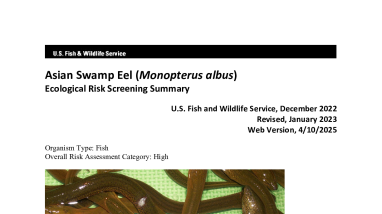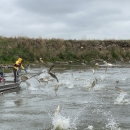Species that are considered high risk have a well-documented history of invasiveness in at least one location globally and are of establishment concern for the contiguous United States based on a climate matching analysis.
Monopterus albus, Asian Swamp Eel, is a fish that is native to eastern and southeastern Asia. This obligate air-breathing, eel-like fish is drought tolerant and will burrow into mud to withstand low water conditions. M. albus is found in trade as a live food source, aquarium species, and is used in some cultural traditions. M. albus has known established populations within the United States that were introduced via live release from the aquarium trade or from fish markets. There are negative impacts of introduced populations documented from peer-reviewed literature for this species, specifically in Florida where significant declines in the abundance of native fishes and decapods were found following the introduction of M. albus. M. albus is regulated in multiple U.S. States. M. albus has also been introduced beyond its native range in Asia and there have been reports of negative economic impacts due to burrowing behavior that has damaged rice fields in the Philippines and Japan. The History of Invasiveness for M. albus is classified as High due to the multiple established nonnative populations that have led to negative impacts. The climate matching analysis for the contiguous United States indicates establishment concern for this species. Areas of high match were recorded in the eastern portion of the country. The Midwest had a mostly medium climate match and areas of low match were found along the West Coast. The Certainty of Assessment for this ERSS is classified as Medium. Although there is a good amount of reliable information for this species, uncertainty exists regarding taxonomic relationships between different established populations and the identity of specimens in trade. Molecular studies have shown that M. albus represents a species complex with up to five potential species that may be recognized with future work. The Overall Risk Assessment Category for M. albus in the contiguous United States is High.



